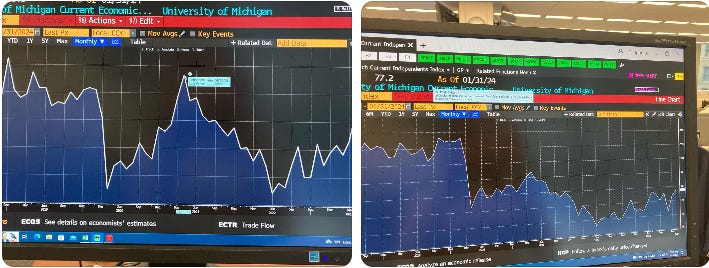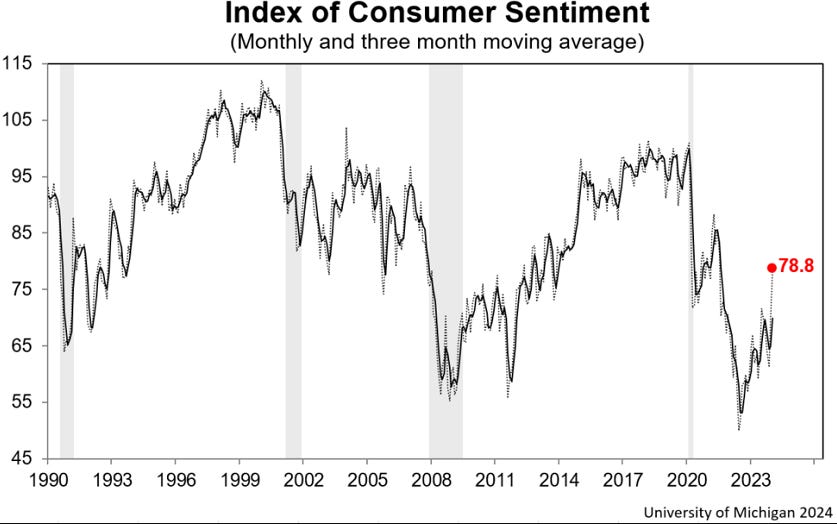BRIEFLY NOTED: For 2024-01-21 Su
The normalization of consumer sentiment continues; Looking back at Silicon Valley “Futurism”; Bari Weiss’s “Free Press” is a parody site; did you have “Christianity as Noble Lie” on your Bingo card?; Moyn’s fantasies of pre-Cold War liberalism; Apple visionPro headset definitely does not look cool; consider Oculus; very briefly noted; & Hexapodia podcast on economic development; Econ 115 lecture 2 on the agrarian age; & BRIEFLY NOTED: For 2024-01-17 We…
& start-of-semester academic-.edu-email-addresses-only sale:
SubStack NOTES:
Economics: The normalization of consumer sentiment continues—now Democrats, Independents, and Republicans all see their current circumstances as largely good. But Republicans think that there must be a lot of other people out there who are suffering unusually under the whip and iron boot of Joe Biden. I wonder why?
Jeanna Smialek: ‘Some hugely optimistic consumer sentiment data in the University of Michigan survey <sca.isr.umich.edu>. Interesting how much of a gap there is between current condition assessments between Dems (huge surge) and Independents (still pretty depressed).,,<https://www.threads.net/@jeannasmialek/post/C2SamgJra8G>
Silicon Valley: Perhaps the major way in which what is going on today and likely to happen in our future differs from the predictions evolve past Silicon Valley “futurists” is this: We, individually, and collectively, have proven much more incompetent at building systems, to allow us to control where we focus our attention than anyone had imagined:
David Karpf: ‘The book project is anchored in the back catalog of WIRED…. The magazine has been around… documenting, celebrating, and advocating for the digital revolution that has permanently been in a state of imminent arrival…. I’m trying to isolate what the impending digital future looked like back then, in the hopes of deriving some insights regarding how we got to now—how the society we currently inhabit diverged from the one the futurists displayed such confidence they were building…. I’ve come across four distinct genres of futurist rhetoric. Each has its own strengths, limitations, and boundaries. “The future” plays a different role in the hands of the pundit, the professional optimist/futurist, the Cassandra and the sci-fi author…. Punditry… crowd[s] out the substantive… with meaningless horserace commentary.… Futurism with a capital “F.” It moves at a slow, deliberate pace, and it is intently focused on divining what the future will be like…. But… [it] comes with factory-installed rose-tinted glasses that cannot be removed… a deep cultural legacy dating back to the 60s Bay area counterculture…. Cassandra-futurists… are “the only people predicting the future who hope to be wrong”… most convinced that people today have agency in shaping tomorrow…. [Charlie] Stross tells us to “always be wary of SF writers bearing ideas.” I think we should pay attention to those ideas, while keeping in mind what they are useful for… <http://davekarpf.substack.com/p/what-we-talk-about-when-we-talk-about>
Neofascist Grifters: Is Bari Weiss’s “The Free Press” a parody site? “Free, independent, and fearless”, they say. But that the real censorship is that while libraries carry books by Barack Obama, they do not carry books by Vivek Ramaswamy—that’s not even a take, although it certainly is an ethos:
Oliver Wiseman: What Books Are Really Getting Banned?: ‘We investigate…. In a new investigation for The Free Press, James Fishback finds… how easy it is for kids to access memoirs by prominent Democrats like Barack and Michelle Obama, compared to memoirs by leading Republicans. More than half of the 35 districts James surveyed carried both of the Obamas’ books. But how many districts carried books by Nikki Haley, Tim Scott, Ron DeSantis, Vivek Ramaswamy, and Mike Pompeo? The answer is zero. That includes school districts in red states like Texas and Florida… <thefp.com/p/banned-books-kelce-2024-pan…>
Public Reason: WAIT! WHAT!? I confess I did not even know that you could have “Christianity as Noble Lie” on your modern Bingo Card:
Nick Cohen: What has Christianity to do with Western values?: ‘Ayaan Hirsi Ali, Vladimir Putin and the clash of civilisations…. The notion that liberal democracy is only for Westerners and is the product of specifically Western religious traditions has always been asinine…. Far from being a sign of democratic solidarity, Christian identity politics has become the friend of every enemy of Western democracy…. Ayaan Hirsi Ali recently made my point for me… announced her conversion to Christianity and unintentionally revealed the fatuity of Christian identity politics…. No embracing of the Nicene Creed; no declaration that Hirsi Ali now believed in one Lord, Jesus Christ, the only Son of God, eternally begotten of the Father. She spoke of a personal crisis and of finding ‘life without any spiritual solace unendurable’. But she made clear that her conversion was rooted in political rather than religious belief…. Ayaan Hirsi Ali has shown extraordinary courage in standing up to the threats of radical Islamists. Tom Holland is the nicest and most intellectually generous historian I have met. But this is hopeless stuff…. The Enlightenment was a reaction against the bigotry and slaughter of the European wars of religion… <nickcohen.substack.com/p/what-has-chris…>
And:
Ayaan Ali Hirsi: Why I am now a Christian: ‘Atheism can’t equip us for civilisational war…. Western civilisation is under threat from three different but related forces… great-power authoritarianism and expansionism… the Chinese Communist Party and Vladimir Putin’s Russia… global Islamism… and the viral spread of woke ideology… eating into the moral fibre of the next generation. We endeavour to fend off these threats with modern, secular tools…. And yet, with every round of conflict, we find ourselves losing ground. We are either running out of money, with our national debt in the tens of trillions of dollars, or we are losing our lead in the technological race with China. But we can’t fight off these formidable forces unless we can answer the question: what is it that unites us?… The only credible answer, I believe, lies in our desire to uphold the legacy of the Judeo-Christian tradition… an elaborate set of ideas and institutions designed to safeguard human life, freedom and dignity—from the nation-state and the rule of law to the institutions of science, health and learning…. Christianity outgrew its dogmatic stage…. Christ’s teaching implied… a circumscribed role for religion… separate from politics… compassion for the sinner… humility for the believer…. The lesson I learned from my years with the Muslim Brotherhood was the power of a unifying story… to attract, engage and mobilise…. Unless we offer something as meaningful… the erosion of our civilisation will continue…. There is no need to look for some new-age concoction of medication and mindfulness. Christianity has it all… <unherd.com/2023/12/why-i-am-now-a-chris…>
Moral Philosophy: my reaction to Samuel Moyn seems to be very close to that of the very sharp John Ganz. Moyn pretends to be a friend to Old Liberalism and an enemy to Cold War Liberalism by constructing an Old Liberalism that never existed at all, anywhere. It leaves me wondering just what the point of it all is:
John Ganz: The Book of Liberal Maladies: ‘On Samuel Moyn’s Cold War Liberalism…. Moyn wants to represent himself as not a critic of liberalism per se but as the recoverer of a more salutary tradition. But he can’t ever really bring himself to do a full-throated defense of that tradition. This gets him tangled up in all kinds of knots…. “Before the Cold War, liberalism largely… an apologia for laissez-faire economic policy… entangled in imperialist expansion and racist hierarchy…” Then he writes that prior to the Cold War, liberalism was “emancipatory and futuristic…” Moyn seems to want to speak in favor of social liberalism. But it also shares the reactive and restraining impulses that he wants to make characteristic of Cold War liberalism…. What does Moyn actually like about liberalism that was lost during the Cold War? He mentions… liberalism’s encounter with romanticism. But… the romantic turn in liberalism was in many ways brought about by disillusionment with and abandonment of revolutionary promise… aristocratic in character, and in some cases, indicated a friendliness to political reaction… <unpopularfront.news/p/the-book-of-liber…>
ONE IMAGE: Apple Vision Pro Headset Definitely Does Not Look Cool:
Mostly, I think, because my East African Plains Ape brain codes their facial expressions as inappropriate to their situation…
ONE VIDEO: MetaQuest3 as a Much Cheaper Alternative:
All-included, $1,000 as opposed to $5,000 for the Apple ought, I think, to have made Facebook dominant in this space, if it really is the case that “Quest3 is 7 out of 10, and visionPRO 8 out of 10…”
Very Briefly Noted:
Economics: Amara Omeokwe & Gwynn Guilford: Americans Are Finally Feeling Better About the Economy: ‘New consumer sentiment data will show if improving mood extends into 2024…. Unemployment is historically low, and hiring is still strong. What has changed is that inflation is cooling rapidly, while mortgage rates are down sharply from last year and the S&P 500 is just off a record high… <https://www.wsj.com/economy/consumers/americans-are-finally-feeling-better-about-the-economy-e964804f>
Cybernetics: Dan Davies: sympathy for the folk devil: ‘In which I disagree with Dominic Cummings…. Where it all goes wrong… is simply that a hand grenade is not a tool of reconstruction. The highest function of the Viable System Model is that of balancing the need to change with the capacity to change… respect the problem, make a realistic assessment of what capacity exists or can be gathered, then think in terms of priorities and trade-offs to meet the most vital and immediate changes…. Systems have to be designed and redesigned, so that they obey the basic principles of “variety engineering” (the management science of ensuring that information arrives in the right place, in time and in a form in which it can be the basis of decision making). That’s what has seemed to be missing from Cummings’ writing; any clearly articulated theory of how things work and how and why they need to change… <backofmind.substack.com/p/sympath…>
Silicon Valley: The Macalope: Vision Pro is already making its AI competition look silly: ‘This isn’t to say the Vision Pro is a sure-fire winner. People who have tried it seem to think it’s great but it’s also very expensive and stares at you with eyes that, if they were a salad dressing, would be Uncanny Hidden Valley Ranch… <https://www.macworld.com/article/2202281/vision-pro-humane-ai-pin-price-specs-functionality.html>
Parker Ortolani: ‘The new Vision Pro guided tour is the best thing they’ve made so far to sell people on the product, choosing to show off someone who has never used it and their reactions was very smart <https://www.apple.com/apple-vision-pro/guided-tour/>… <https://www.threads.net/@parkerortolani/post/C2SMZENOkH6>
Azeem Azhar & Arvind Srinivas: If I had to pick one AI tool… this would be it: ‘On Perplexity.ai with co-founder Aravind Srinivas…. Google’s innovator’s dilemma. The fuzzy art of shipping products built on AI models. AI as ignition for a new era of human entrepreneurship. Mapping out the route to AGI. Going from from autocomplete to autopilot in the coming years. Safety in a world with billions of AIs. AI open-source: democratizing progress or losing control? Beyond the technology: how do we get the public behind this journey?… <http://exponentialview.co/p/perplexity-aravind-srinivas>
Central Country: Nicholas Welch: Debating China’s Industrial Policy: ‘The famous face-off between Chinese economists Justin Lin and Zhang Weiying—command or commerce?… According to Lin, China’s slowing growth is the result of ineffective structural transformation. The market, despite being a good tool for resource allocation, often veers away from the outlined pattern of structural upgrade due to two types of market failures…. The externality problem… the asymmetry between the costs of failure and the benefits of success…. The coordination problem. Successful industrial upgrades… require the perfection of infrastructure…. Absent these kinds of infrastructure, the transaction costs for industrial upgrade would be too high for enterprises…. [But] industrial policy, from Zhang’s perspective, is nothing but a “planned economy in disguise,” condemned to failure due to incentive distortions and the limits of human cognition. Innovations are unpredictable; before technologies are tested by the market, no one can foresee which ones will significantly affect our lives… <chinatalk.media/p/debatin…>
Politics: Jamelle Bouie: ‘The basic answer to “why won’t the DNC primary biden” is that exactly one person has beaten Donald Trump on a national ticket, and it is Joe Biden. No one within the institutional democratic party wants to take a risk on someone else… <https://bsky.app/profile/jbouie.bsky.social/post/3kjbuaknipy22>
Neofascist Grifters: Justin Fox: New York City Is a Lot Safer Than Small-Town America: ‘Put homicide and transportation risks together, and New York starts looking like a refuge from the American carnage…. The risk of death from truly external causes, as defined here, is three times higher in rural and small-town America than in the country’s largest city…. Murder scares people a lot more than accidents do… Some heavily rural states (Mississippi, Arkansas) are a lot more dangerous than others (Vermont, Iowa)… <https://www.bloomberg.com/opinion/articles/2022-06-07/is-new-york-city-more-dangerous-than-rural-america>
Ancient History: Bret Devereaux: : ‘From 200 to 148 BC, the Romans win every single major land engagement fought against a Hellenistic power…. On the other hand, all of those victories have their own quirks…. And moreover, this staggeringly lopsided Roman success was relatively new: Rome had fought Pyrrhus of Epirus’ Hellenistic-style army in three major engagements from 280 to 275 and didn’t decisively win any of them, though none of Pyrrhus’ victories were anything like as decisive as the parade of Roman triumphs during the second century, despite Pyrrhus being regarded in our sources as the finest general of his generation… <https://acoup.blog/2024/01/19/collections-phalanxs-twilight-legions-triumph-part-ia-heirs-of-alexander/>
Politics-as-Expressive-Theatre: Noah Smith: ‘It’s absolutely hilarious how the DSA is literally trying to apply post-Keynesian economics to their own private finances…. Rafi Ash: “As we approach the DSA convention, our budget is a hot topic. Some criticisms lean into self-destructive austerity and reproduce narratives of fiscal restraint that sound suspiciously like neoliberalism. To build a mass organization for democratic socialist politics, convention delegates should reject a politics of austerity. Austerity is not a path towards growth…. The solution to DSA’s current fiscal fears is growth and active outward organizing. Financial security for the organization should be rooted in our current values and political models rather than viewed as something to be achieved for its own sake…. This positive organizing framework does not necessarily mean funding everything all of the time…. But to avoid austerity politics, we should debate measures on their own merits rather than on the abstract financialized metric of budget balancing…



